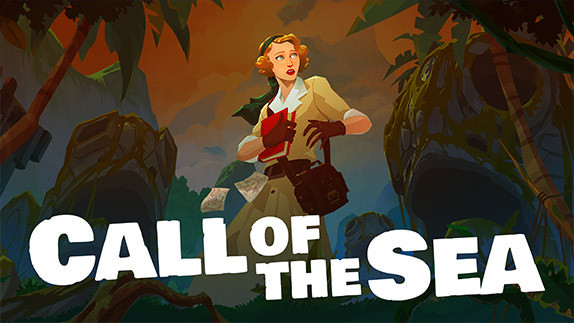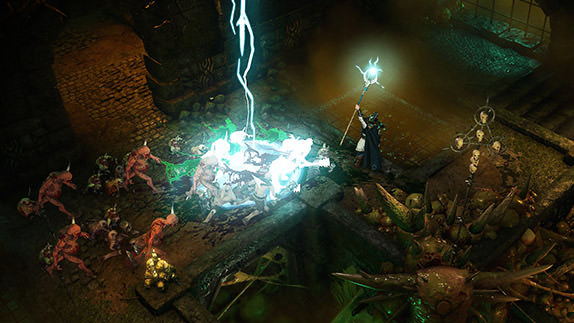Divinity: Original Sin Enhanced Edition Review

At some point in the evolution of the genre, RPGs have become streamlined in an effort to widen the demographic. Big open worlds often funnel players from quest to quest with no real challenge or sense of discovery. With the intention to bring the genre back to its hardcore roots, Larian Studios’ Divinity: Original Sin Enhanced Edition does so in excellent form. There has never been a better time to play this amazing return to RPG greatness than in this well-crafted console port.
You play as two customizable “source hunters”, “source” being the equivalent of an evil magic. Tasked with eradicating “source” from the land and defeating the “Sourcerers”, commanders of the “source”, this is a simple objective, but the game puts weight on the phrase, “it is not the destination, but the journey”. Along the way, you will meet companions that can join your party to aid your quest, towns full of NPCs needing favors from you, and secret caves and dungeons that may hold precious loot at the end. The brilliance of all this is that you discover and craft this adventure yourself.
Completing the short tutorial, I found myself a bit lost exploring the game's largest town of Cyseal. I checked my quest log to see only a brief description of what I had already learned from a wizard I had just finished talking to. It was up to me to figure out how to make progress in the quest and how to go about it. Sometimes I found solutions to my quests in ways I had not originally thought of, only to reload my most recent save and discover that I could have also solved it differently, resulting in a new outcome. I was never at the whim of the game; Divinity assumed I had a conscious mind and rewarded me with a feeling that brought substance to what I was doing.
This game is a living and breathing world that heightens your curiosity by what is found. Exploring sections of the land may lead you to a mysterious church that demands a peek inside or a villager surrounded by skeletons and in need of your help to get him back to safety. There is always something around the next corner, and that makes the game exciting, especially when defending against a sudden ambush of enemies.
Combat is consistent of a typical core RPG with an interesting expansion on how things play out. Each character on the battlefield, whether friend or foe, takes a turn performing an action that costs AP points. This includes moving, using items, attacking, using skills, etc. It is a simplistic approach that works well, keeping the focus on the battle rather than micromanaging multiple resources. Each turn is essential, and you'll want to use an arsenal of varied skills to come out victorious in each encounter. Failure is not an option, and losing a single fight will end the game prematurely.
It is also important to watch for elemental effects. Not only do characters get status ailments, but the environment itself can be affected causing the ground to burn with fire or acidic clouds to form. These can be eliminated with certain spells, like rain putting out the fire for example, but it can also be used to your advantage as your enemies are just as susceptible. It is this kind of tactical complexity that brings a real challenge to the game that is satisfying to conquer.
Exploring the vast landscape occurs at a pace that is more leisurely than necessary. Waypoints that can be accessed at any time to warp quickly around to where you need to be, but it doesn’t take you close enough to make the slow movement speed acceptable. I found this the most grueling in towns where you have to bounce around from person to person, often in long branching dialogue conversations.
I enjoyed the depth of the conversations and how they set up quests nicely, but when you have to talk to a lot of people back to back, the heavy dialogue slows the pace of the game. It also doesn’t help that a lot of the dialogue choices are out of your control. As with most RPGs, there are branching dialogue trees were characters will react differently depending on what you say. The strange part of this is that multiple party members will feel the need to give their opinion on the situation at hand, without your control (especially in multiplayer). If they disagree with you, you are forced to play a game of rock-paper-scissors to decide whose opinion is used in the conversation with the NPC. This made no sense to me. Why is my character stopping me from doing what I want to do just because I didn’t start the conversation as them?
Local split-screen cooperative gameplay was added to the PS4 version of Divinity, and it works well. A partner can take over another character in your party and help you on your quest. Online multiplayer also exists but is still restricted to controlling the host's characters. Joining a random online session is a gamble, as you won't know ahead of time the classes of the host's team. It does, however, make the game a lot easier. Both players can complete separate objectives and then meet back later to enjoy the spoils. I often found myself sticking with my friend when it came to combat as a smaller party made it astronomically more difficult.
An Enhanced Experience
Divinity: Original Sin Enhanced Edition is much more than a simple PC to console port, as there are also 1000+ changes to the game. The basic framework of the game is similar, but the game is vastly different now than when it was initially reviewed in 2014. I should note that all of the content updates and changes that exist in the PS4 version of the game have been added to the PC version via an update.
Along with the revamped story, complete with new regions to explore and a newly developed ending, all of the game's dialogue is fully voiced by some of the top voice actors in the industry.
Much like the release of Diablo III on console, bringing Divinity over to console meant designing an all-new UI. Playing the game with both input mechanics, I've found the game more accessible when using a controller.
Simply Put
For the first time in a long while, I remembered why I fell in love with RPGs in the first place. It is not simply about bouncing around to exclamation marks getting quests for the EXP and gold; it is about the adventure. Divinity is real RPG journey in every sense of the word. There is a main narrative and other characters who have problems you must solve, but it is up to you to discover what needs to be done and decide how you want to go about it. It is one of the smartest turn-based RPGs to come out in years.
Note: Divinity: Original Sin Enhanced Edition was reviewed on PlayStation 4. A digital copy of the game was provided by the publisher/developer.




